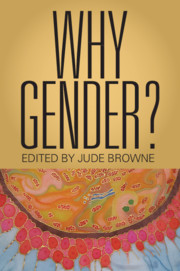Book contents
- Why Gender?
- Why Gender?
- Copyright page
- Dedication
- Contents
- Figures
- Tables
- Contributors
- A Prefatory Note
- Acknowledgements
- Introduction
- Chapter 1 Gender in Translation: Beyond Monolingualism
- Chapter 2 Gender and the Queer/Trans* Undercommons
- Chapter 3 Gender and the End of Biological Determinism
- Chapter 4 Gender, Sexuality, Race, and Colonialism
- Chapter 5 Posthuman Feminism and Gender Methodology
- Chapter 6 Gender, Sperm Troubles, and Assisted Reproductive Technologies
- Chapter 7 Gender, Capital, and Care
- Chapter 8 Aspiration Management: Gender, Race, Class, and the Child as Waste
- Chapter 9 Gender, Race and American National Identity: The First Black First Family
- Chapter 10 Gender and the Collective
- Chapter 11 Willfulness, Feminism, and the Gendering of Will
- Chapter 12 Gender and Emigré Political Thought: Hannah Arendt and Judith Shklar
- Chapter 13 Feminism and the Abomination of Violence: Gender Thought and Unthought
- Chapter 14 Trafficking, Prostitution, and Inequality: The Centrality of Gender
- Chapter 15 Gender, Revenge, Mutation, and War
- Chapter 16 Bed Peace and Gender Abnorms
- Index
- References
Chapter 1 - Gender in Translation: Beyond Monolingualism
Published online by Cambridge University Press: 15 October 2021
- Why Gender?
- Why Gender?
- Copyright page
- Dedication
- Contents
- Figures
- Tables
- Contributors
- A Prefatory Note
- Acknowledgements
- Introduction
- Chapter 1 Gender in Translation: Beyond Monolingualism
- Chapter 2 Gender and the Queer/Trans* Undercommons
- Chapter 3 Gender and the End of Biological Determinism
- Chapter 4 Gender, Sexuality, Race, and Colonialism
- Chapter 5 Posthuman Feminism and Gender Methodology
- Chapter 6 Gender, Sperm Troubles, and Assisted Reproductive Technologies
- Chapter 7 Gender, Capital, and Care
- Chapter 8 Aspiration Management: Gender, Race, Class, and the Child as Waste
- Chapter 9 Gender, Race and American National Identity: The First Black First Family
- Chapter 10 Gender and the Collective
- Chapter 11 Willfulness, Feminism, and the Gendering of Will
- Chapter 12 Gender and Emigré Political Thought: Hannah Arendt and Judith Shklar
- Chapter 13 Feminism and the Abomination of Violence: Gender Thought and Unthought
- Chapter 14 Trafficking, Prostitution, and Inequality: The Centrality of Gender
- Chapter 15 Gender, Revenge, Mutation, and War
- Chapter 16 Bed Peace and Gender Abnorms
- Index
- References
Summary
In this chapter I consider how dangerous and disturbing the term “gender” has become in the minds of those who fear its power and influence (Gallo, 2017). The stated concern about “gender” as a foreign term, an English term, acting on local or national cultures as if it were a foreign element or, indeed, a foreign power is matched by a presumption within feminist and LGBTIQ theory that “gender” can function as a generalizable concept no matter the language into which it enters.
- Type
- Chapter
- Information
- Why Gender? , pp. 15 - 37Publisher: Cambridge University PressPrint publication year: 2021
References
- 2
- Cited by



